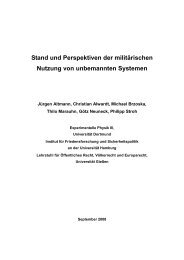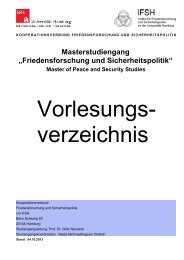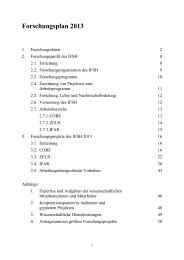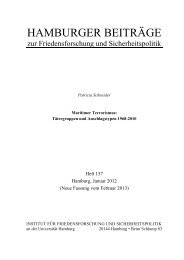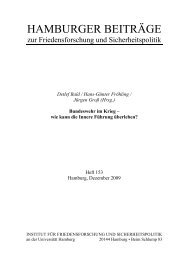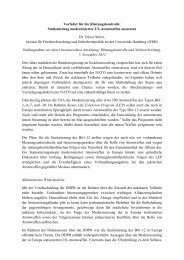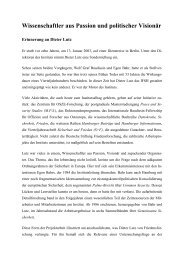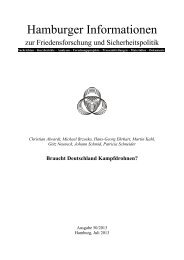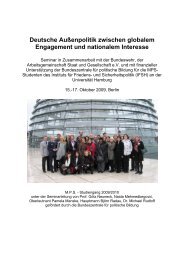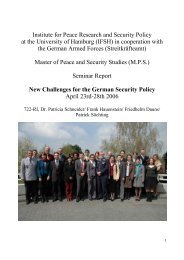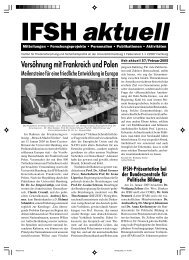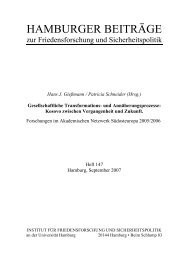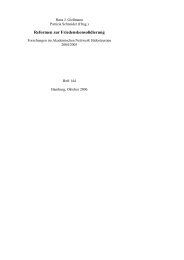Minority Rights Protection and Human Rights Policies in ... - IFSH
Minority Rights Protection and Human Rights Policies in ... - IFSH
Minority Rights Protection and Human Rights Policies in ... - IFSH
You also want an ePaper? Increase the reach of your titles
YUMPU automatically turns print PDFs into web optimized ePapers that Google loves.
Elena Kulipanova, M.P.S. c<strong>and</strong>idate at the <strong>IFSH</strong>: Models of accommodation<br />
Elena gave a presentation about “Internal dimension of self-determ<strong>in</strong>ation, models of<br />
accommodation”. Elena underl<strong>in</strong>ed the importance of the right of political participation <strong>in</strong> the<br />
concept of <strong>in</strong>ternal self- determ<strong>in</strong>ation, because she considers it as essential for the<br />
preservation <strong>and</strong> promotion of the dist<strong>in</strong>ctive identity of a m<strong>in</strong>ority <strong>and</strong> the protection of their<br />
group <strong>in</strong>terest. Elena lectured about the different forms of <strong>in</strong>ternal self-determ<strong>in</strong>ation, for<br />
<strong>in</strong>stance territorial rights like autonomy, decentralization, regionalisation, federalism <strong>and</strong><br />
consociationalism. She furthermore gave some <strong>in</strong>formation about historical <strong>and</strong> contemporary<br />
aspects of <strong>in</strong>ternal self-determ<strong>in</strong>ation <strong>and</strong> she stressed the “Report on Constructive National<br />
Arrangements for M<strong>in</strong>orities“ by Special Rapporteur Asbjörn Eide of the Sub-Commission on<br />
the Prevention of Discrim<strong>in</strong>ation <strong>and</strong> <strong>Protection</strong> of M<strong>in</strong>orities <strong>in</strong> 1993, deal<strong>in</strong>g with possible<br />
ways <strong>and</strong> means of facilitat<strong>in</strong>g the peaceful <strong>and</strong> constructive solution of problems <strong>in</strong>volv<strong>in</strong>g<br />
m<strong>in</strong>orities, as well as the emphasized need for arrangements enabl<strong>in</strong>g g m<strong>in</strong>orities to enjoy<br />
effective participation <strong>in</strong> the decision-mak<strong>in</strong>g process of a state. Elena presented three<br />
different models of accommodation that have been applied <strong>in</strong> Western Europe: centralization,<br />
federalism <strong>and</strong> consociationalism. When speak<strong>in</strong>g about the system of centralization, Elena<br />
gave the example of the Sc<strong>and</strong><strong>in</strong>avian countries <strong>and</strong> the United K<strong>in</strong>gdom, where the system of<br />
giv<strong>in</strong>g concessions to co-nations <strong>in</strong> various degrees (without chang<strong>in</strong>g their constitution as<br />
unitary states) has quite a long tradition. Then Elena referred to Will Kymlicka, who<br />
dist<strong>in</strong>guishes between two models of federalism, the Canadian/ Swiss model <strong>and</strong> the model of<br />
the United States. While <strong>in</strong> Canada an “asymmetric federalism” is applied, <strong>in</strong> Switzerl<strong>and</strong> one<br />
can f<strong>in</strong>d a system of “federal consociationalism”. The last system, “consociationalism”, is a<br />
complex model of power-shar<strong>in</strong>g referr<strong>in</strong>g to groups that are not territorial def<strong>in</strong>ed, Elena<br />
quoted Arend Lijphart <strong>and</strong> his theories. The model of consociationalism was successfully<br />
applied <strong>in</strong> the Netherl<strong>and</strong>s between 1917 until 1967.<br />
Pol<strong>in</strong>a Dolgikh, M.P.S. c<strong>and</strong>idate at the <strong>IFSH</strong>: Russian m<strong>in</strong>ority <strong>in</strong> Estonia<br />
Pol<strong>in</strong>a gave a presentation about “Social problems of the Russian m<strong>in</strong>ority <strong>in</strong> Estonia”. Pol<strong>in</strong>a<br />
talked about the emergence of the problems <strong>and</strong> the development of the situation <strong>in</strong> Estonia,<br />
as well as the outcome of the “Integration program” for the Russian speak<strong>in</strong>g m<strong>in</strong>ority <strong>in</strong><br />
Estonia <strong>in</strong> 2000. She also talked about changes <strong>in</strong> the attitude of the titular nation <strong>and</strong><br />
controversial future perspectives. Pol<strong>in</strong>a po<strong>in</strong>ted out that the roots of<br />
the conflict <strong>in</strong> Estonia could be located <strong>in</strong> times before World War II,<br />
among many Estonians the attitude, that Russians <strong>in</strong> Estonia nowadays<br />
are sometime still regarded as “former occupants” is common, said<br />
Pol<strong>in</strong>a. Russians <strong>in</strong> Estonia often have an alien passport <strong>and</strong> Pol<strong>in</strong>a<br />
mentioned as a ma<strong>in</strong> future problem that there is a also a lack of will to<br />
assimilate among some parts of the Russian speak<strong>in</strong>g m<strong>in</strong>ority,<br />
comb<strong>in</strong>ed with some Estonian’s unwill<strong>in</strong>gness <strong>and</strong> fear to treat the<br />
Russians <strong>in</strong> Estonia as equal members of their society. As a mean of<br />
<strong>in</strong>tegration, Pol<strong>in</strong>a mentioned the necessary reduction of the language<br />
barriers between the Russian speak<strong>in</strong>g m<strong>in</strong>ority <strong>and</strong> the titular nation,<br />
<strong>and</strong> she po<strong>in</strong>ted out, that <strong>in</strong>tegration could also maybe reached by<br />
emphasiz<strong>in</strong>g the “EU-identity” of Estonia.<br />
23



